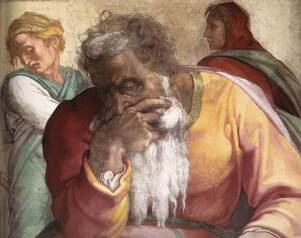 / Jeremiah was called as a prophet while he was a young man. It was n the thirteenth year of the reign of King Josiah who at the time was only twenty-one himself. Five years into Jeremiah’s ministry, Josiah ordered that the temple be refurbished. It had fallen into disrepair during the 55-year reign of his grandfather Manasseh and the brief two-year reign of his father Amon. Josiah did not inherit a great legacy as II Kings 21:2 says of Manasseh, “He did evil in the sight of the Lord, according to the abominations of the nations whom the Lord had cast out before the children of Israel.” And of his father Amon, II Kings 21:21-23 says, “He walked in all the ways that his father had walked; and he served the idols that his father had served, and worshiped them. He forsook the Lord God of his fathers, and did not walk in the way of the Lord. Then the servants of Amon conspired against him, and killed the king in his own house.” The temple renovations that began with the goal of doing a major rebuilding of the physical structure, took a major shift when the Book of the Law was discovered. It seems like the Word of God had gotten lost in the people’s pursuit of happiness. Hilkiah the high priest said to Shaphan the scribe, “I have found the Book of the Law in the house of the Lord.” And Hilkiah gave the book to Shaphan, and he read it. So Shaphan the scribe went to the king, bringing the king word, saying, “Your servants have gathered the money that was found in the house, and have delivered it into the hand of those who do the work, who oversee the house of the Lord.” Then Shaphan the scribe showed the king, saying, “Hilkiah the priest has given me a book.” And Shaphan read it before the king. Now it happened, when the king heard the words of the Book of the Law, that he tore his clothes” (II Kings 22:8-10) Josiah’s reaction to the Book of the Law provided some much-needed spiritual fresh air. Now the king sent them to gather all the elders of Judah and Jerusalem to him. The king went up to the house of the Lord with all the men of Judah, and with him all the inhabitants of Jerusalem—the priests and the prophets and all the people, both small and great. And he read in their hearing all the words of the Book of the Covenant which had been found in the house of the Lord. Then the king stood by a pillar and made a covenant before the Lord, to follow the Lord and to keep His commandments and His testimonies and His statutes, with all his heart and all his soul, to perform the words of this covenant that were written in this book. And all the people took a stand for the covenant” (II Kings 23:1-3). With this kind of exciting beginning, how on earth did Jeremiah get tagged with the title “the Weeping Prophet?” The simple answer is that Josiah’s reforms were too little too late. II Kings 23:26-27 records the bad news that he heard from God: Nevertheless the Lord did not turn from the fierceness of His great wrath, with which His anger was aroused against Judah, because of all the provocations with which Manasseh had provoked Him. And the Lord said, “I will also remove Judah from My sight, as I have removed Israel, and will cast off this city Jerusalem which I have chosen, and the house of which I said, ‘My name shall be there.’” While contemporaries like Daniel, Hananiah, Mishael, and Azariah were taken to Babylon where God powerfully worked in their lives, God left Jeremiah in Judah. He was called to proclaim “thus sayeth the Lord” to men and women who refused to listen to the word of God. Eventually, he was taken against his will to Egypt where he died in the midst of an unrepentant people.
With all that is happening in our nation and our convention, I can’t help thinking about Jeremiah’s world. Is God removing His hand of protection from us? And if He has, is it too late for us to repent? I quickly reflected on these questions as I prayed about how I should respond to a pastor’s question I received via e-mail this weekend as some of us were processing the announced resignation of Dr. Ronnie Floyd. The pastor wrote, “I’m not sure what the future holds for the convention, but I know that the future of the church is strong. Any advice on how to lead through this mess or if there is anything to do to help the Convention?” After reflecting for a few minutes, I responded, “My suggestion is to do what I’m going to do: pray harder and with greater brokenness and work harder to keep biblical, life-transformative disciple-making THE main thing on my heart and on my agenda every day.” The reality for every pastor and every professing Christian is that there is only one person in the world that we have the authority and ability to change and that is our self. And when we are honest, we will admit there are days when that alone can be an overwhelming task. I’m a “To-Do List” kind of guy and here are some things I try to keep on the top of my list:
Yours in Christ, Mark R. Elliott, AMS
0 Comments
Leave a Reply. |
AuthorRetired in April 2022, Mark R. Elliott served as a Director of Missions (Associational Mission Strategist) in Western Iowa and Eastern Nebraska for almost three decades. He is a strong advocate for obedience and Biblically based disciple making. As such, he knows that making healthy disciples requires Christian leaders to be constantly pursuing spiritual maturity—be lifelong learners. Because of the time constraints of ministry, most pastors focus their reading list on resources that assist them in teaching and preaching the Word of God. As such, books focusing on church health, leadership development, and church growth tend to find their way to the bottom of the stack. With that reality in mind, Mark has written discussion summaries on several books that have helped him to personally grow in Christ and that tend to find themselves on the bottom of most pastor’s stack. Many pastors have found them helpful as they are able to more quickly process great insights from other pastors and authors. Archives
April 2022
Categories |
Looking for something? |
© COPYRIGHT 2024. ALL RIGHTS RESERVED.
|



 RSS Feed
RSS Feed
